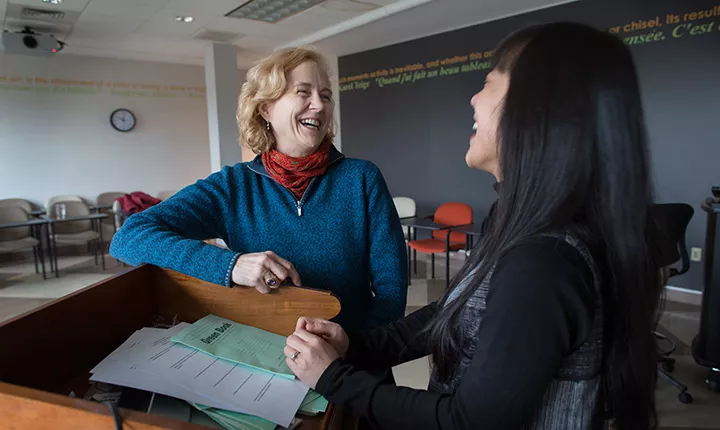Swarthmore Professors Stress Importance of Teaching in Higher Education

English literature professor Elizabeth Bolton (left) and art historian Tomoko Sakomura sat in on each other's classes as part of an educator's coaching program on campus.
Inside Higher Ed: Teaching Ourselves to Teach
College and university faculty members should work with mentors, coaches and colleagues to continually reflect on their own practice of teaching, write Kenneth Sharpe and Elizabeth Bolton.
The need to “educate for judgment” is as urgent for those of us who teach at universities and professional schools today as it was for Aristotle. Twenty-five years ago, three expert professors at Harvard Business School reminded and guided their colleagues in the professions to do exactly that. C. Roland Christensen, David Garvin and Ann Sweet, the editors of Education for Judgment, rightly noticed that the way we professors teach our students often discourages them from learning how to exercise independent judgment in their scholarship, in their professions, in their lives. The first step in turning this around is for teachers themselves to learn how to reflect on their own practices so that they can encourage their students to exercise judgment, too.
Obvious? Perhaps. But Richard Elmore’s observation in the foreword to the book is not that far off the mark today, noting that “teaching is seldom taken as a subject for serious intellectual discourse in universities.” In fact, most of our students, if they knew, would find this amazing, even troubling: we college teachers have never been taught how to teach, and we generally work in isolation on improving our practice.
If we were lucky, we were teaching assistants in graduate school, placed in charge of smaller discussion sections for the lecture classes given by the famous professors. If we were really lucky, the senior professor gave us some guidance on our pedagogy.
Yet most of us started as college teachers woefully inexperienced and unprepared. Some colleges and universities have recognized that lack of preparation in recent years and have created centers for teaching excellence, offering lectures, workshops and maybe the chance to have your class videotaped. But Education for Judgment signaled a still-missing ingredient needed for learning how to practice our craft wisely: structured ways that those of us who are experts as well as novices can reflect on our ongoing teaching practices.
Outside of academe, this approach is not rocket science. Firefighters routinely do post-incident reviews in the same ways that athletes review videos of the game they just played. Novice public school teachers practice teaching with trained teachers. That’s also how interns and residents learn doctoring. Continuing mentoring and coaching are essential for even expert musicians, singers and athletes.
But when professors start teaching, they are largely isolated in their own classrooms. Worse, with the criteria for tenure traditionally being “publish or perish,” collegial reflection about improving our teaching expertise is not encouraged. Indeed, young faculty members who show a serious concern about their teaching are often warned about “misplaced priorities.”
Many professors would like to improve their expertise in leading discussion classes and lectures so as to foster understanding, deep engagement with the material, curiosity and wonderment, and a passion for lifelong learning. They want especially to foster students’ capacities to exercise the judgment they need to apply their learning to their lives and work. But college and university teachers -- any teachers -- can only develop the judgment that expertise requires the way any expert develops such judgment: by working with mentors, coaches and colleagues to continually reflect on their own practice of teaching.
There is already some coaching of faculty going on. Some colleges and universities (including Swarthmore) assign senior faculty members to mentor young faculty, bring in outside teaching coaches on a paid basis or hold workshops that instruct teachers how to be sensitive to diversity or to teach more effectively. Yet we and some of our colleagues at Swarthmore wanted to go further: to teach faculty to be peer coaches for each other, to combine one-on-one coaching with group reflection, to privilege ongoing observation and coaching over onetime or short-term encounters, and to create a continuous process that could renew and improve the wider culture of pedagogy at the college.
Read the full article at Inside Higher Ed.
Elizabeth Bolton specializes in eighteenth and nineteenth century literature, especially that of the Romantic period; her courses feature poetry, fiction, drama, and many kinds of non-fictional prose, from diary entries to essays. She also teaches courses in the English Department's creative writing offerings. She is the author of Women, Nationalism, and the Romantic Stage: Theatre and Politics in Britain, 1780-1800. Her current book project is The Epic Ambitions of Romantic Lyric.
An expert on foreign policy, Latin American politics, and U.S. drug enforcement policies, Kenneth Sharpe is the co-author of Drug War Politics: The Price of Denial (University of California, 1996), which examines the ineffectiveness of the America's punitive narcotics policy and calls instead for a public-health approach that aims to reduce demand for drugs. Sharpe, the William R. Kenan Jr. Professor of Political Science, has also written about the political economy of the Mexican auto industry, the relationship between U.S. foreign policy and constitutional democracy, and the imperial presidency, among other topics.



